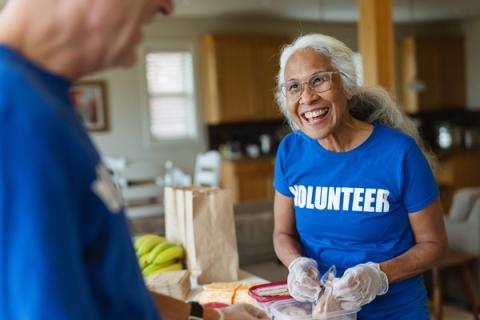The Value of Volunteering in Our Later Years
Volunteering, at its core, is a celebration of community and contribution. For older adults, it represents an avenue to stay connected with the world around them. The sense of being part of something larger than oneself, of making a tangible difference, is both empowering and affirming. In our older years, when many of us face the challenges of retirement, loss, or isolation, volunteering stands as a reminder of our invaluable place in society.
The health benefits of volunteering for older adults are well-documented. Engaging in community service activities has been shown to enhance both physical and mental health. Whether it’s organizing community events, mentoring young people, or participating in environmental conservation efforts, these activities keep the brain active and engaged, which is crucial in warding off cognitive decline. A recent study showed that less-wealthy older volunteers reap even larger rewards than their wealthier counterparts, making it a sort of health equalizer.
“We already know that volunteering, in general, is good for you,” said Seoyoun Kim, a researcher from the University of Texas. “Yet what is notable about this study is that it shows how volunteering’s health effect among older adults in the lowest wealth quintile—whose average wealth is negative—is stronger than for the highest wealth quintile of older adults. This is important, as the lowest wealth quintile of older adults began with lower self-rated health,” stated the investigators.
Emotionally, volunteering offers a profound sense of fulfillment. There is an undeniable joy in helping others, a kind of happiness that material possessions or leisure activities seldom bring. This fulfillment often translates into improved mental health, with studies indicating that volunteers experience lower levels of depression and increased life satisfaction. In a phase of life when individuals may struggle with finding their purpose post-retirement, volunteering provides a meaningful pursuit.
Socially, volunteering opens doors to new friendships and connections. It brings together individuals from diverse backgrounds, fostering an environment of learning and understanding. For older adults, this social aspect is invaluable. It breaks the shackles of loneliness and isolation, offering regular interaction and the development of new, potentially deep and lasting relationships.
“Humans are social creatures by nature,” said Eric S. Kim, a researcher from the Harvard T.H. Chan School of Public Health. “Perhaps this is why our minds and bodies are rewarded when we give to others. Our results show that volunteerism among older adults doesn’t just strengthen communities, but enriches our own lives by strengthening our bonds to others, helping us feel a sense of purpose and well-being, and protecting us from feelings of loneliness, depression, and hopelessness.”
Volunteering also offers an opportunity for older adults to pass on their wisdom and skills. It’s a platform for intergenerational exchange, where seniors can mentor younger volunteers, sharing their life experiences and skills. This exchange is not just beneficial for the recipients; it affirms the older adults’ sense of worth and identity, showcasing that their years have bestowed upon them a wealth of knowledge that is both relevant and needed.
Finally, volunteering provides a sense of continuity and legacy. Many seniors are compelled to give back, to leave a mark on the communities that have shaped their lives. Volunteering allows them to contribute to a better world for future generations, a legacy of service and compassion.
So as we begin the new year, consider the ways you can give back to your community, no matter your abilities. Your health will thank you for it!
